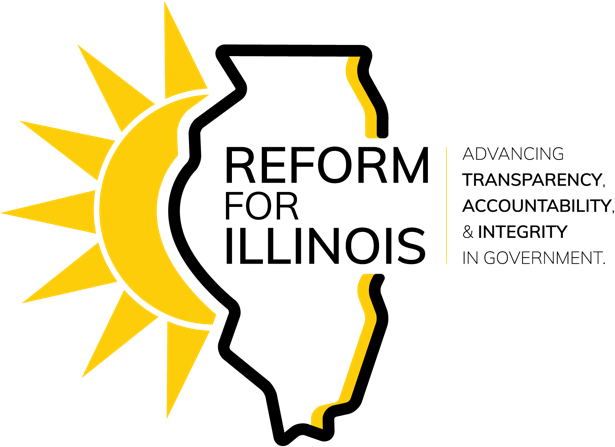A Drop in the Bucket: How Small Donors are Left Behind in Chicago’s 2023 Mayoral Race
Who’s funding Chicago’s mayoral race? Not everyday Chicagoans. Our analysis of contributions in this year’s contest shows that small donors – defined as individuals who contribute up to $150* – play a tiny role in most candidates’ fundraising. Meanwhile, megadonations flood the field, with contributions over $10K making up 57% of funds raised through the end of 2022.
The voices of ordinary Chicagoans shouldn’t be drowned out by wealthy donors and special interests. And they don’t have to be. A publicly financed small donor matching or voucher program would enable candidates to power a campaign with contributions from regular people, amplifying the voices of everyday Chicagoans and reducing the pay-to-play politics that benefits those who can afford to pay over those who can’t.
The Chicago City Council’s Ethics Committee held a hearing about public campaign financing last month, and all mayoral candidates except Willie Wilson have come out in support of such a program for Chicago elections. As the numbers below show, the need for reform is clear.
Small donors contributed just 0.9% of total funds in the race
We looked at contribution data for all nine mayoral candidates from the start of their campaigns through December 31, 2022, the last date for which small donor data is currently available. Committees in Illinois only disclose small donor contributions as part of their quarterly reports; the next batch of small donor data will be reported in mid-April.
By the end of 2022, the nine mayoral contenders had raised a total of $16.2 million. We found that donations of up to $150 accounted for a mere $144K of that total, or about 0.9%. In the last mayoral election in 2019, we found the percentage was about 1.4%.
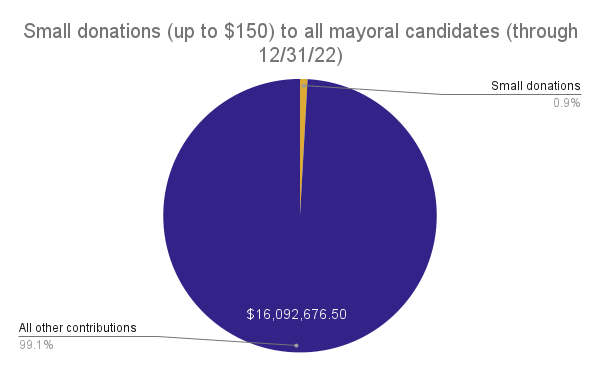
Candidate rankings by percentage of fundraising totals from small donors
| Candidate | Small Donor Percentage | Fundraising Total as of 12/31/2022 | Small Donor Total |
| Ja’Mal Green | 22.46% | $95,538.61 | $21,456.11 |
| Kam Buckner | 12.8% | $273,413.93 | $35,007.78 |
| Sophia King | 1.35% | $442,297.00 | $5,953.00 |
| Lori Lightfoot | 1.14% | $3,748,206.14 | $42,838.38 |
| Paul Vallas | 0.62% | $2,175,770.33 | $13,580.14 |
| Jesús “Chuy” Garcia | 0.51% | $1,481,984.36 | $7,613.37 |
| Brandon Johnson | 0.49% | $1,834,829.40 | $8,994.40 |
| Willie Wilson | 0.14% | $6,078,752.00 | $8,672.00 |
| Roderick Sawyer | 0% | $106,000 | $0.00 |
Wealthy megadonors play an outsized role
Our analysis of contributions during the 2019 mayoral election showed that wealthy individual megadonors (contributing $10K or more) accounted for almost half of all funds in that race. So far, big donors have had an even larger piece of the pie in this year’s mayoral contest: by the end of 2022, 91 individual donors – not unions, LLCs, or other corporate entities, but individuals – gave a total of $9.3 million to mayoral candidates, representing more than 57% of all funds raised.
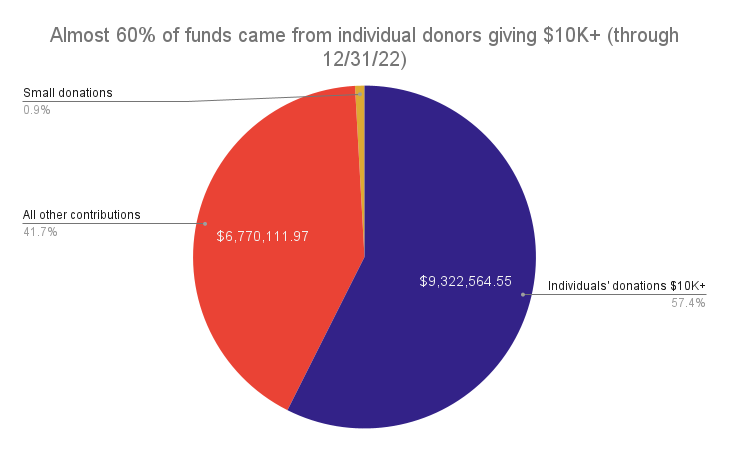
Candidate rankings based on reliance on $10K+ donations from individuals
| Candidate | Large Donor ($10K+) Percentage | Large Donor ($10K+) Total | Number of Large Donors ($10K+) |
| Willie Wilson | 99.03% | $6,020,000 | 2 |
| Paul Vallas | 87.56% | $1,905,200 | 33 |
| Lori Lightfoot | 32.36% | $1,212,800 | 48 |
| Sophia King | 25.10% | $111,000 | 5 |
| Ja’Mal Green | 14.20% | $13,564.55 | 1 (Self) |
| Roderick Sawyer | 9.43% | $10,000 | 1 |
| Chuy García | 3.37% | $50,000 | 1 |
| Kam Buckner (tied) | 0% | $0 | 0 |
| Brandon Johnson (tied) | 0% | $0 | 0 |
Where all that money is coming from
Vallas’s top sixteen individual donors gave him almost three-quarters of his campaign cash
Aside from the almost totally self-funding Willie Wilson, Paul Vallas has the highest concentration of cash from wealthy individuals. By the end of 2022, Vallas’s top sixteen individual donors – all of whom contributed $50K or more to his campaign – accounted for about 74% of his fundraising. Most of these individual donors to Vallas’s campaign are part of the financial services sector. Donors contributing $10K or more account for another $300K of Vallas’s fundraising, meaning that over 87% of Vallas’s campaign cash through the end of 2022 came from contributions above $10K.
Vallas’s largest donor is Chicago-area businessman Mike Keiser, who contributed $600K to his campaign last year and another $100K in January. Keiser alone accounted for about 27% of Vallas’s fundraising last year.
Since the start of 2023, Vallas has raised more than $2 million from additional donations of $10K or more. Vallas’s largest individual contribution since the start of this year is a $200K donation from billionaire CEO of Koch Foods, Joseph C Grendys.
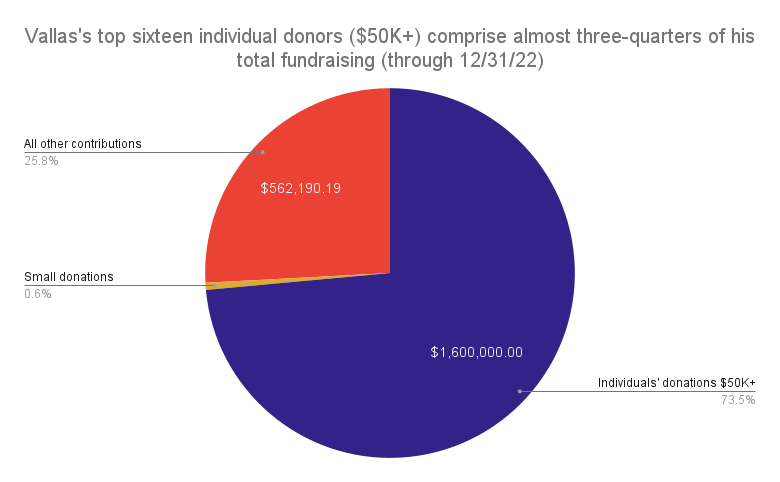
García draws from labor support, his congressional committee, and allies
About 64% of Jesús “Chuy” García’s total fundraising through the end of 2022 came from a combination of labor support and transfers from García’s own congressional committee and other elected officials. A single $500K donation from the International Union of Operating Engineers Local 150’s Fight Back Fund accounts for just over one-third of García’s fundraising haul in 2022. Most of the elected officials contributing to García are Illinoisans, though California Congressman Ted Lieu gave him $6.8K.
While García’s campaign didn’t rely heavily on big donations from wealthy individuals in 2022, he did receive $50K from David Pavlik, the co-founder and managing partner of the Decennial Group, a real estate investment and development platform. Pavlik’s donation is included in the “All other contributions” section of the pie chart below.
García, like most of the other candidates, did not raise a significant amount from small donors in 2022 – just a half a percent.
Though it’s not reflected in the below chart, García received another $500K from the Fight Back Fund in January, bringing his total from that group to $1 million. García’s other fundraising in 2023 largely matches the trends above.
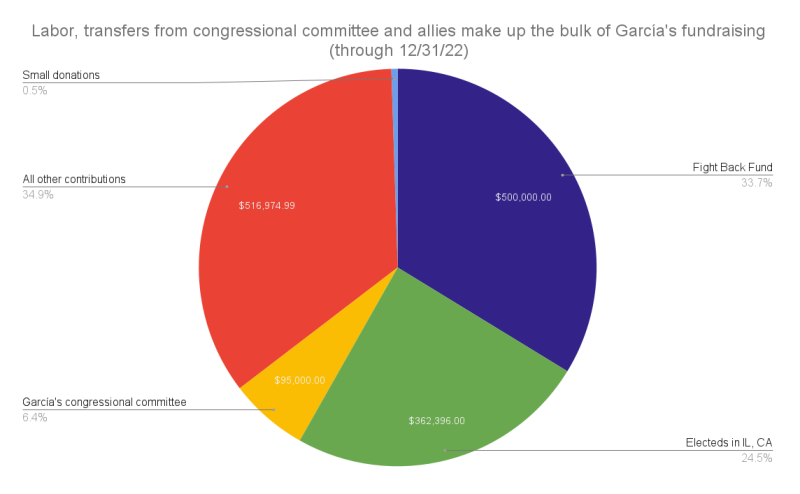
Almost all Johnson’s campaign cash comes from unions
Brandon Johnson was the other late entry in this year’s mayoral race, though his union support quickly allowed him to outpace many of his competitors in overall fundraising. Transfers from teachers and labor unions (and their affiliated PACs) account for 97.6% of Johnson’s total fundraising through the end of 2022. Teachers unions contributed over $1.2 million to Johnson’s campaign during the fourth quarter, while other labor groups contributed $551K. The Chicago Teachers Union’s financial involvement in Johnson’s race has caused some controversy.
Unlike donations from wealthy individuals or most business interests discussed here, union donations are largely composed of contributions from the groups’ members.
Johnson did not report any large donations from individuals during 2022’s last quarter. Combined with the $8.9K he received via small donations of up to $150, Johnson raised just $43K from non-union sources.
Unions remain Johnson’s strongest supporters in 2023, having transferred more than $1.1 million to his campaign in January and February. Johnson’s largest contributions this year include $490K in transfers from the Chicago Teachers Union PAC and a $400K transfer from the American Federation of Teachers COPE.
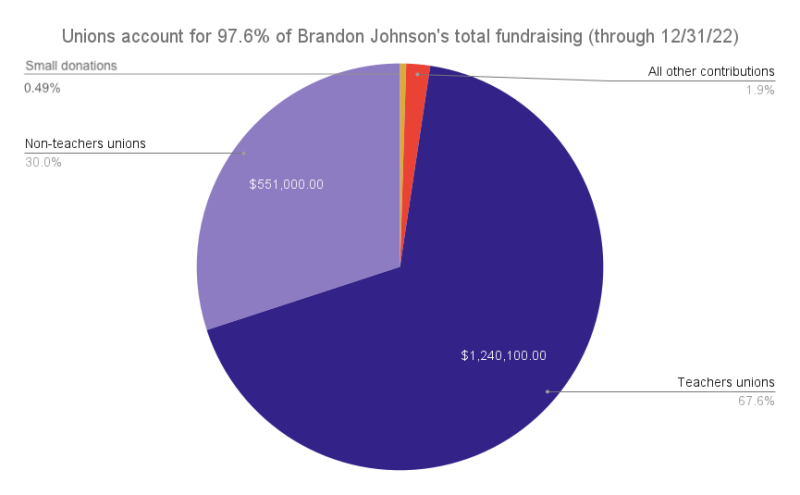
Megadonors ($10K+) and labor account for half of Lightfoot’s fundraising
Just over half of Mayor Lori Lightfoot’s fundraising comes from a combination of megadonors and unions. Her largest individual donors are Cubs co-owner Laura Ricketts and businessman Fred Eychaner, who contributed $178K and $150K respectively to her campaign in 2022. Ricketts donated another $16K in-kind to Lightfoot for various event-related expenses last year.
Two labor groups have also contributed significant amounts to Lightfoot’s reelection campaign: the Carpentry Advancement Political Action Committee Fund transferred $400K to Lightfoot during the last three quarters of 2022, and the Chicago Journeymen Plumbers’ L.U. 130 U.A. Political Fund transferred another $100K back in December.
Notably, Lightfoot was the top recipient of small donor funds in her last election in 2019, with 8% of her campaign total coming from those contributions. In this election that number has dropped to just over 1%.
Since the start of 2023, Lightfoot has received an additional $100K from Ricketts, $150K from Eychaner, and $150K from the Carpentry Advancement Political Action Committee Fund.
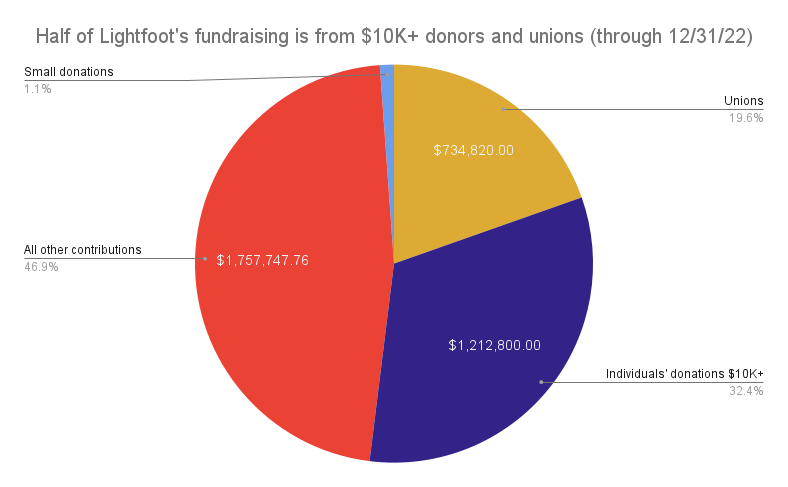
Another piece of the puzzle: super PACs
We focused on candidate committees in this report, but “independent expenditure” super PACs have played a larger role than ever before in this year’s mayoral race. And while a significant portion of that money is “dark,” meaning we don’t know where it came from, it’s likely that much of it is from wealthy donors and deep-pocketed entities. At least some big contributions to a Lightfoot-supporting PAC came from city contractors.
For more information about the super PAC players in the mayoral race, see A.D. Quig and Greg Pratt’s reporting in the Chicago Tribune, Justin Laurence’s piece in Crain’s Chicago Business, Heather Cherone for WTTW, and Dan Mihalopolous for WBEZ.
For more information on how to fight corruption and give everyday Chicagoans a greater voice in their democracy, see Reform for Illinois’ testimony on public campaign financing before the Chicago City Council’s Ethics Committee and the Chicago Sun-Times coverage of the committee hearing.
Special thanks to RFI Research Assistants Annie Dhal, Ryan Michaud, and Aidan Shannon for their assistance in preparing this report.
*We use $150 as the small donation threshold in part because it approximates a widely accepted standard and in part because Illinois law requires only donations over $150 to be itemized on campaign finance reports. We recognize that $150 is not, in fact, a very small donation. $150 is a significant amount of money for many, if not most, people. That donations at or below that level comprise such a small portion of fundraising shows just how excluded from the process people of average or modest means are.
Back
